Centripetal Forces
political
economic
social/cultural
Centrifugal Forces
political
economic
social/cultural
Devolutionary Forces
physical/geographic
political
economic
social/cultural
Political Forces
devolution
balkanization
ethnic nationalism
ethnic separatism
failed state
ethnic cleansing
irredentism
Centrifugal Forces
Often, a minority population is concentrated in various pockets of a state, thus resulting in minority self-awareness and an emerging nationalist movement. Regionalism is when loyalty to a distinct portion of a country is more important than loyalty to the entire country. Regionalism can create centrifugal forces.
When a segment of a state’s minority population feels underrepresented and lacking political power, it might pursue a path of separation from the larger state. Canada provides a good example. The country’s French-speaking population, concentrated in southern Quebec, has pursued more power over local issues, such as education and administrative governance, including its judicial system. However, for some French-speaking Canadians in Quebec, this is not enough; therefore, political centrifugal forces still exist.
On the economic side, globalization has widened the gap between the rich and poor within a state. Uneven development within a country may lead to divisions between the “haves” and the “have-nots.” Uneven development results in uneven benefits and the separation and fragmentation of a state. For example, India is an emerging economic power, but it is not a strongly united country. Despite rapid economic growth on a global scale, India still has large segments of its population living in abject poverty. This poverty is divided along regional lines.
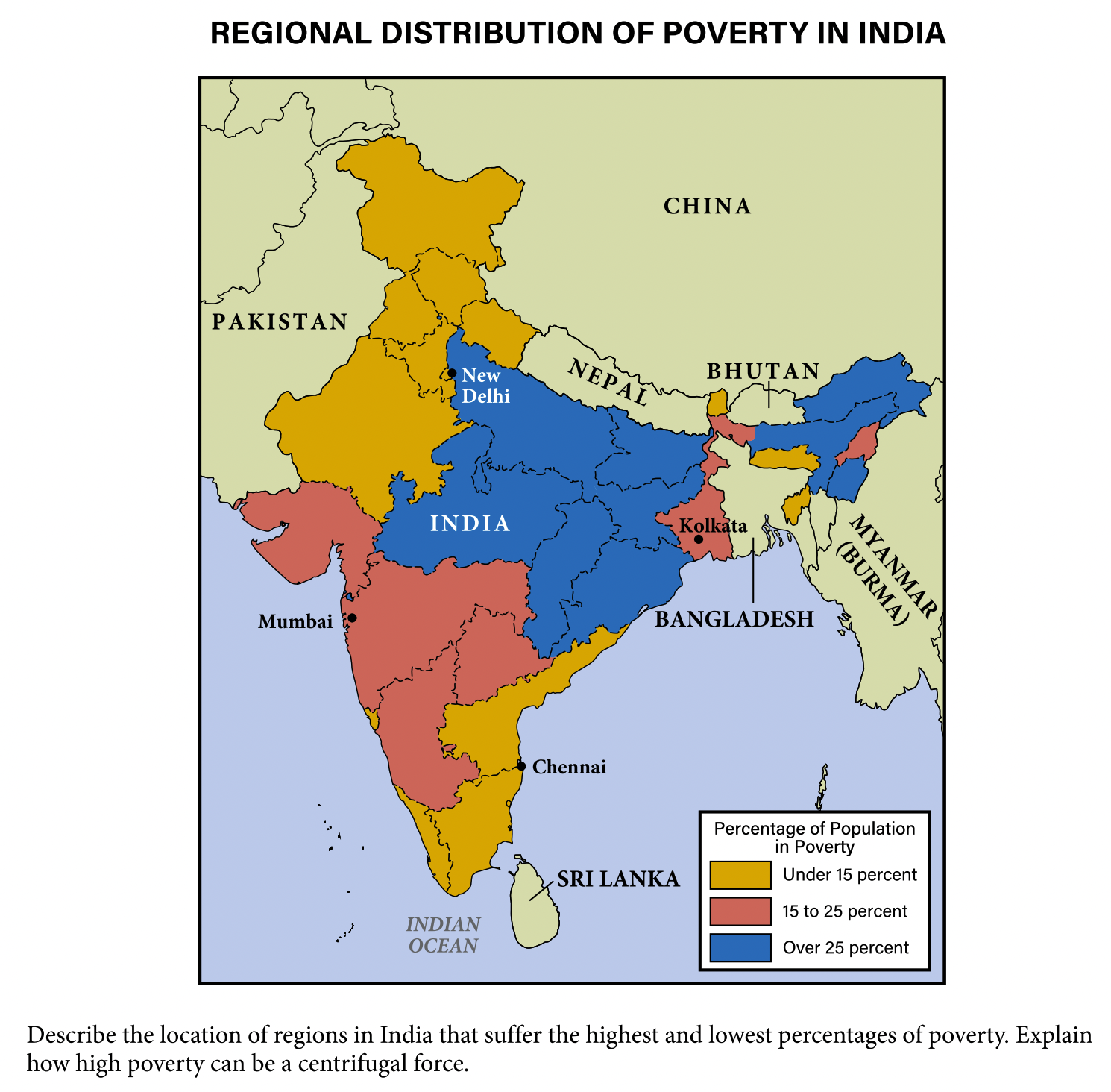
Centrifugal Cultural Forces
Centrifugal cultural forces have intensified as a result of globalization. Declining state sovereignty and economic advances have empowered ethnonational groups to demand more autonomy. Ethnonationalism is support for the political interests of a particular ethnic group within a state, especially its national independence or self-determination. For example, fragmentation within Syria and Iraq gave rise to Kurdish independence movements in those countries.
Centripetal Forces
Governments, religious groups, and other institutions use a combination of methods to promote unity in a society. Centripetal forces are often focused on economic development, political identity, and cultural practices.
Economic Development
One of the most effective centripetal forces used by governments throughout history has been building infrastructure. Improved infrastructure—such as efficient transportation systems and well-constructed roads and railways—can promote trade, communications, dependence, and other forms of connections among the population within a state. Improvements in transportation are one way to promote unity by increasing interaction among different ethno-linguistic groups. These can increase the overall wealth of the country.
Political Identity
Governments attempt to build political unity throughout its population in several ways:
- Unifying institutions, such as schools, promote social cohesion by educating students on the historical accomplishments of the state. Unifying institutions may also promote holidays that are historically significant, such as an independence day or a day to honor veterans.
- Nationalism, the strong feelings of patriotism and loyalty one feels toward one’s country, promotes a sense of belonging, even if a country’s population is an ethnically diverse one.
- The acceptance of rules or laws and the promotion of political equality help to reinforce political centripetal forces. Examples of this are governmental administration practices, such as a fair legal and judicial system and protection of the populace by the government.
- Customs and rituals based on citizenship are a common way to promote a sense of common identity, such as reciting the Pledge of Allegiance or standing for the National Anthem.
Cultural Practices in Homogenous States
States with a population that is homogeneous, one that shares a common trait, likely have cultural practices that function as centripetal forces. For example, in heavily Islamic countries such as Saudi Arabia and Pakistan, Ramadan is a month-long religious observation that helps to unite the overall population. Japan, which has preserved a homogeneous culture by maintaining restrictive immigration policies, has strong cultural centripetal forces such as a common language and a shared sense of history.
Cultural Practices in Heterogenous States
States like the United States, which is made up of many ethnic groups, will also promote cultural rituals and practices that function as centripetal forces. Holidays like Thanksgiving and 4th of July are examples of holidays with specific cultural practices that are not tied to one specific ethnic group. Super Bowl Sunday is a similar example. Corporations and advertisers use this concept, with success, to create “consumer holidays” like Black Friday, to encourage us to go out for a day of shopping.
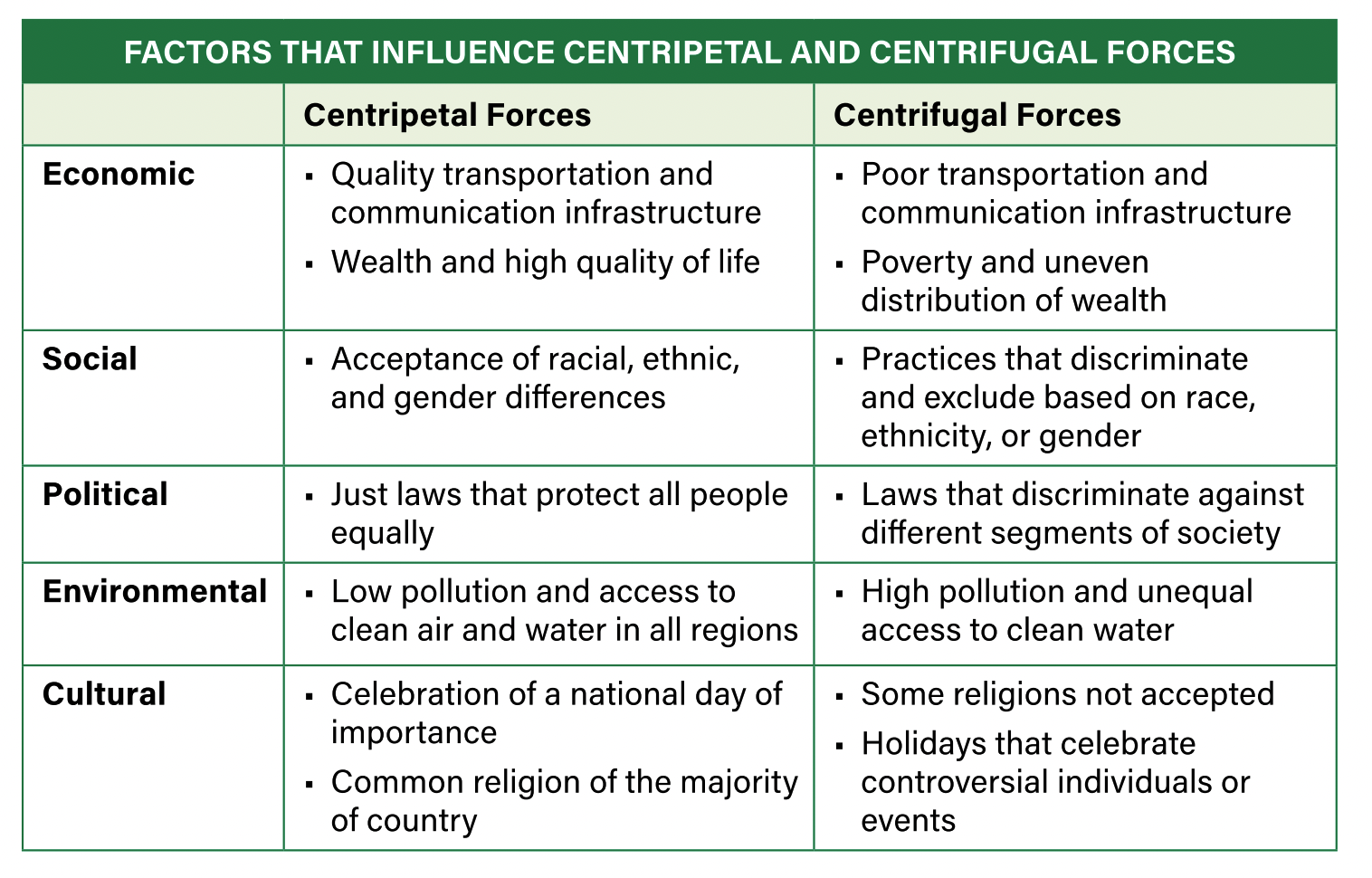
Forces Leading to Devolution
Within a country, groups or regions can feel disconnected and disempowered, leading to a lack of national pride. In these cases, groups often feel that local or regional issues are being ignored by the central government, causing anger and distrust toward the government to arise. If the feelings are strong and sustained, demands for changes in the political system can increase. This tension can lead to demands from the population ranging from more control in political affairs to complete separation.
A central government might respond to these pressures by granting some powers while keeping the country united. This is a process called devolution, the transfer of some political power from the central government to subnational levels of government. The powers within a government—administrative, judicial, and legislative—are divided among the national government and subnational levels. This division varies among countries and is influenced by whether the state has a unitary or federal system.
Ethnic Separatism
Many ethnic separatist movements throughout the world take place within specific regional lines within states. Ethnic separatism is the advocacy of full political separation (or secession) from the larger group along cultural, ethnic, tribal, or governmental lines. Ethnic groups and minorities are often concentrated in specific regions, which can lead to independence movements. In order to maintain unity, the central government will often grant more authority to these ethnic regions via devolution.
For example, Spain has two culturally and linguistically distinct groups within its border, the Basques and Catalans, in addition to the Spanish. The Basque Country was granted semi-autonomy in 1979 by the Spanish government. Groups in Catalan are still seeking separation on the grounds of cultural differences and lack of power in the Spanish government. However, the intensity of their separatism is tied to actions by the central government of Spain. For example, if the national government imposes more restrictions throughout the country, then the Basques and Catalans may intensify their desire for independence. If the national government allows more local autonomy, it hopes that the desire for independence will decrease.
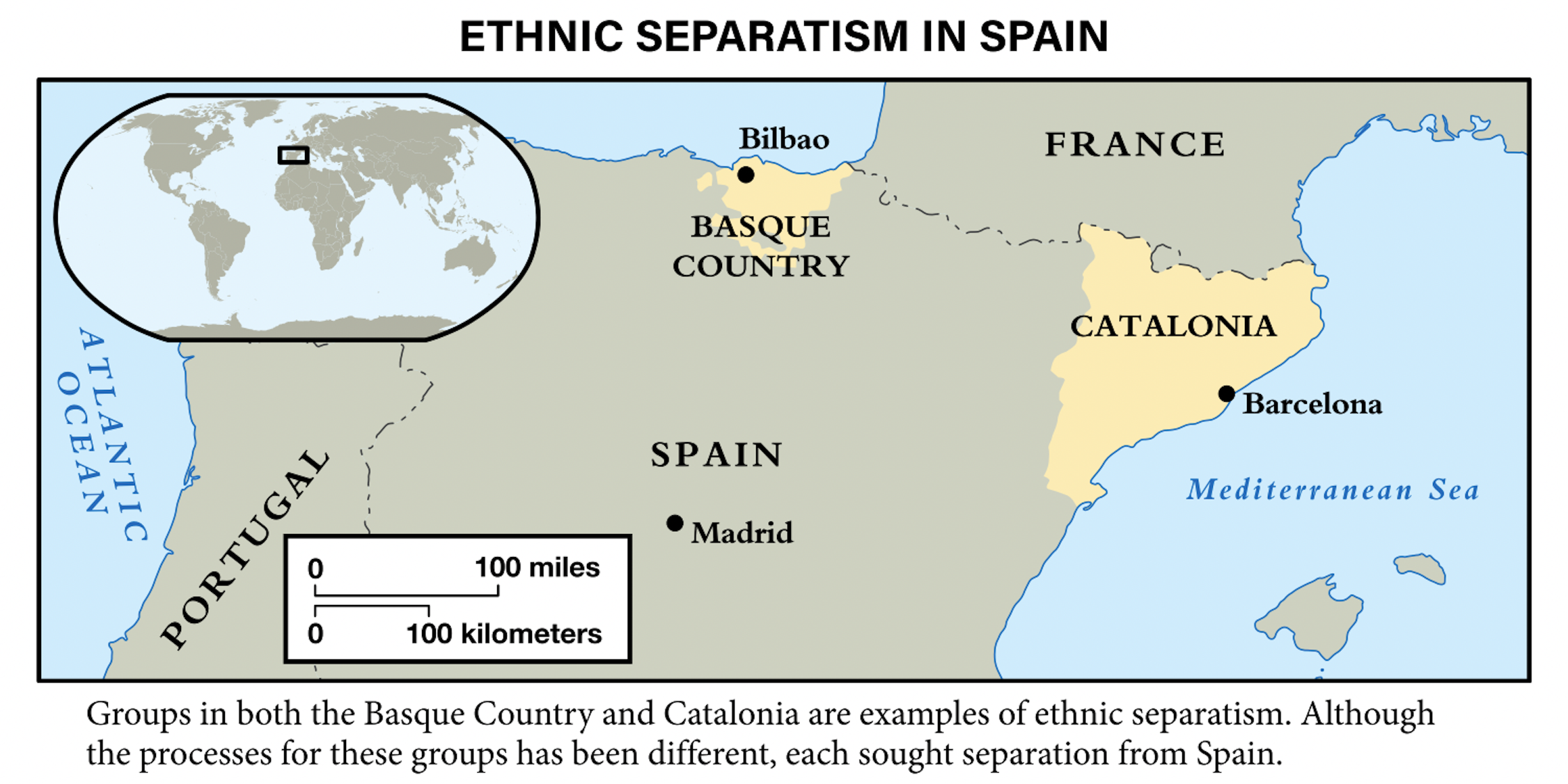
Ethnic Cleansing
Ethnic groups may seek separatism because of how they are treated within a country. Certain ethnic groups may be persecuted or not have equal status from the government. In extreme cases, acts of genocide and/or ethnic cleansing attempt to eliminate a group of people from a country. The United Nations Commission of Experts described ethnic cleansing as “a purposeful policy designed by one ethnic or religious group to remove by violent or terror-inspiring means the civilian population of another ethnic or religious group from certain geographic areas.” Coercive tactics that have been used in ethnic cleansing include destruction of property, attacks on civilians, arbitrary arrest, rape, torture, and murder.
The concept is grounded in the desire to create an ethnically homogeneous nation-state. The term arose out of the conflict in the former Yugoslavia in the 1990s. Examples from earlier in history include European colonists in North America who killed or drove away Native Americans, Hitler’s attempt to eliminate all Jews from Germany, and Poles who forced Germans to leave Poland after World War I. More recent examples have been carried out by Russians against the Chechens in the Caucasus Mountains, Indonesians against the people of East Timor, and the Sudanese against people in Darfur, In each of these, hundreds of thousands of people were killed or forced to flee their homes.
Terrorism
Terrorism is organized violence aimed at government and civilian targets to create fear for the advancement of political goals. It is most commonly used by non-governmental groups that do not have an army.
Ethnic separatists sometimes employ terrorist tactics in hopes of achieving devolution. Since its inception in 1959, the Basque nationalist/separatist group Euskadi Ta Askatasuna (ETA) has fought for independence from Spain. Increased frustration spurred ETA to wage a campaign of violence beginning in 1968. After more than 820 deaths, ETA declared a permanent cessation of armed activities in 2011. However, ETA continued to seek independence of the Basque region from Spain.
On a global scale, terrorism often has its roots in specific regions or countries. Terrorist groups seeking power and recognition within a country can expand their operations across international borders and even on a global scale. Al Qaeda has its roots among Sunni Muslims fighting against Soviet occupation of Afghanistan in the 1980s. However, in 1996, Al Qaeda directed its aggression toward the United States to protest U.S. support of Saudi Arabia and Israel. A series of attacks in eastern Africa and the Arabian Peninsula in the 1990s culminated in the attacks on the World Trade Center and Pentagon on September 11, 2001.
Economic Forces
Control of natural resources, such as mineral deposits, can prompt regions of countries to advocate for devolution. People in one region might want to use locally produced wealth for local benefits, such as better schools, infrastructure, and healthcare- or simply to lower taxes. The central government might argue that these resources should benefit the entire country.
Social Issues
Social devolution often follows geographic divisions between religious, linguistic, and historical regions. Countries experiencing social devolution usually have concentrated pockets of a specific religion or distinct spoken language by the local inhabitants. Federal systems, as in the United States and Canada, allow local governments to maintain their distinct languages and religions.
The situation in Belgium, in northwestern Europe, is quite different. As the bilingual sign below reflects, the country is split into the Flemish-speaking north, called Flanders, and the French-speaking south, called Wallonia. As a result of linguistic, cultural, and economic differences, the country is sharply divided. Each region has its own institutions and many people identify themselves as Flemish or Walloon rather than Belgian. The future of Belgium as a single country is in doubt.
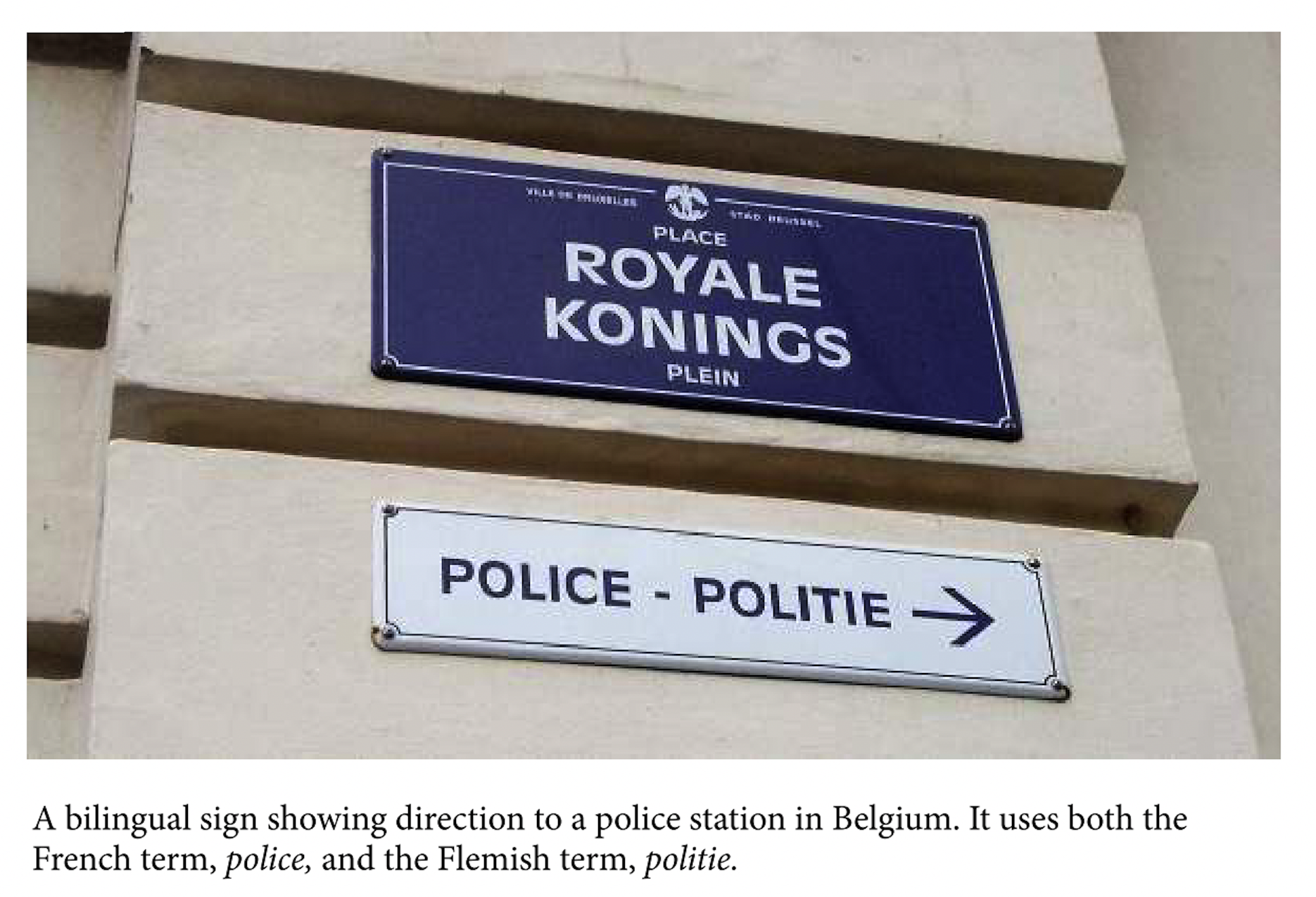
Irredentism
Irredentism is a movement to unite people who share a language or other cultural elements but are divided by a national boundary. One example of irredentism comes from the Caucasus Mountains region. Under the Soviet Union, Nagorno-Karabakh was an Armenian-majority region within Azerbaijan. However, when the Soviet Union collapsed in 1991, Armenians in Nagorno-Karabakh demanded that they be allowed to join the country of Armenia, which supported their demands. Azerbaijan refused, and war broke out. It is estimated that 30,000 people died before a cease-fire in 1994. In theory, a new state was created, the Nagorno-Karabakh Republic. In practice, the new state became part of the country of Armenia. In the fall of 2020, the conflict reignited, and as a result, Armenia will return the territories to Azerbaijan that it occupied after the 1994 cease-fire.
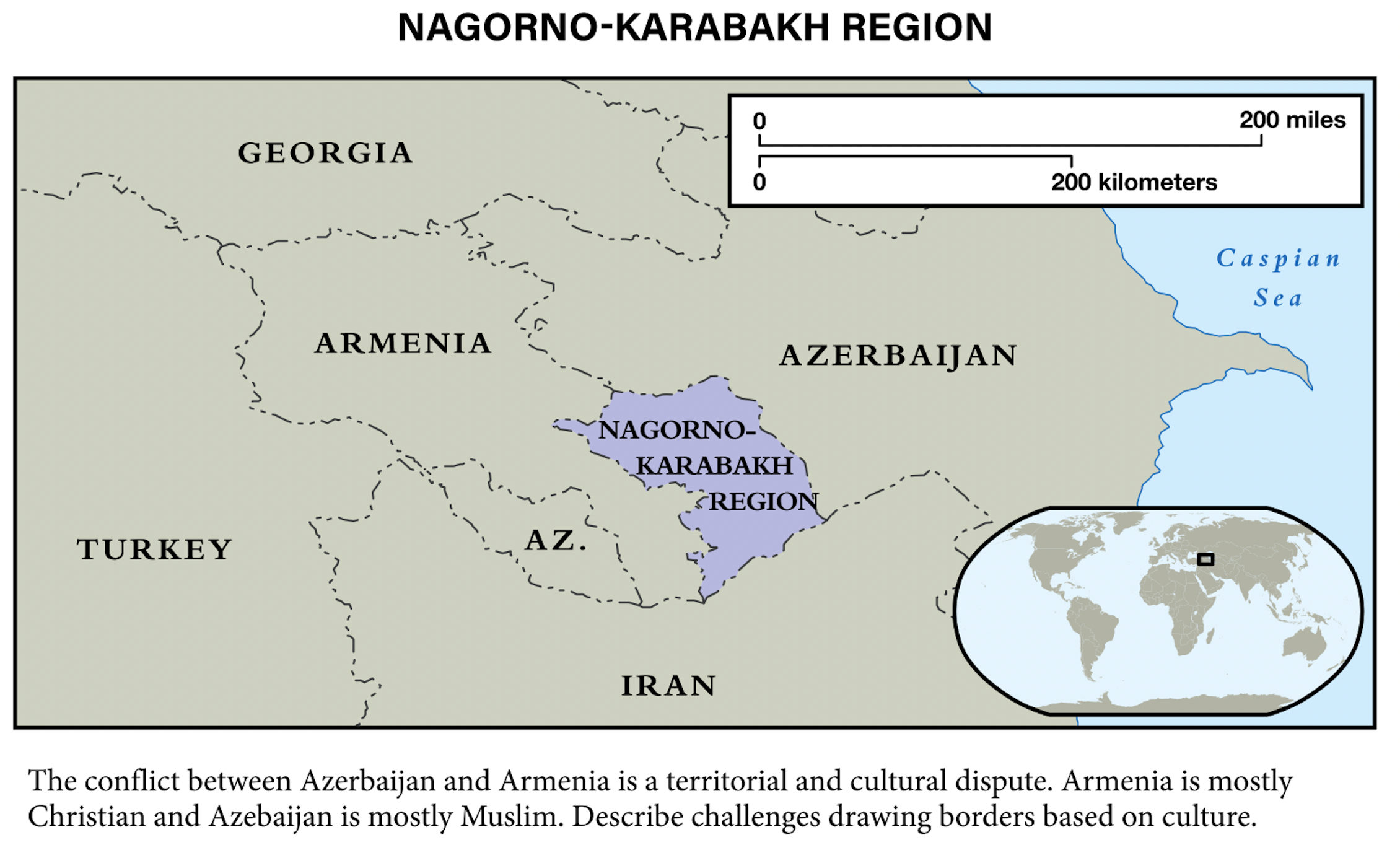
Balkanization
Sometimes an entire country or region explodes in ethnic conflict, as the Balkan Mountains region in southeastern Europe did in the early 1900s and again in the 1990s. The rugged mountains of the area made communication difficult, so the region developed a high density of distinct cultural groups–Serbs, Croats, Slovenes, Bulgars, Romanians, and others. In the early 1900s, several of these groups demanded independence from the Austrian and Ottoman empires that controlled the region.
In 1918, several of these Balkan ethnic groups that felt threatened by the Communist victory in the Russia Revolution joined together to form Yugoslavia. However, when the Soviet Union collapsed in 1990, tensions and ethnic cleansing once again fractured the region into multiple countries. Today, balkanization means the fragmentation of a state or region into smaller, often hostile, units along ethno-linguistic lines. Areas that suffer from balkanization are also known as shatterbelts.
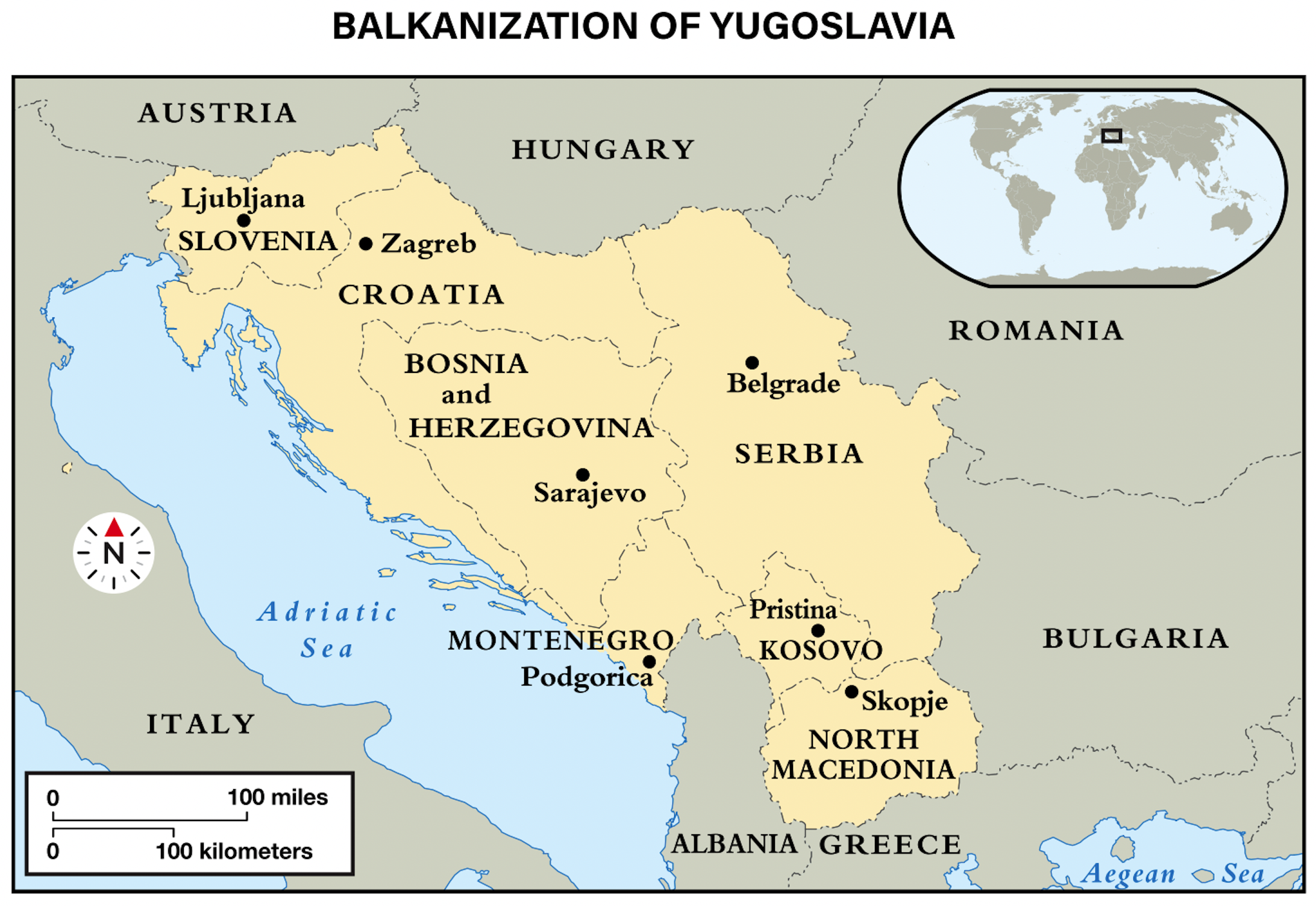
The country of Sudan was one of the largest countries in Africa when it gained its independence in 1956 from Britain and Egypt. Sudan has a history of numerous civil wars and strife. The southern regions of Sudan are non-Arab, Christian, and animist, while the north is Arab and Muslim. People of the southern regions felt persecuted and marginalized by those in the north. After a long and bloody civil war, with approximately 1.5 million deaths, the country of Southern Sudan was granted independence in 2011. Southern Sudan is very culturally diverse and is experiencing increasing internal disputes recently.
In 1962, after 30 years of internal conflict, Ethiopia annexed the coastal country of Eritrea to gain access to the Red Sea. In 1993, Eritrea declared its independence from Ethiopia and in 2000 the two countries signed a peace agreement to resolve boundary issues over land claimed by both countries. Eritrea claims separate nationality based on ethnic, linguistic, and cultural differences. Both countries signed a formal peace agreement in 2018 that ended the hostilities. In December 2020, the northern province of Ethiopia, Tigray, erupted into conflict and attempted to gain independence which further destabilized the region and country.
